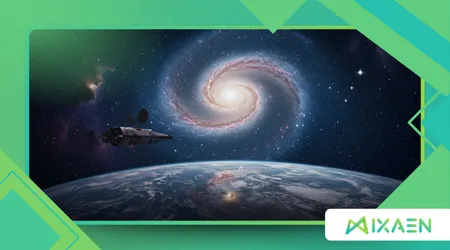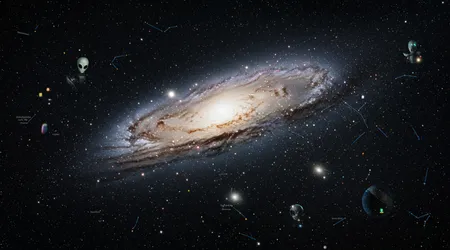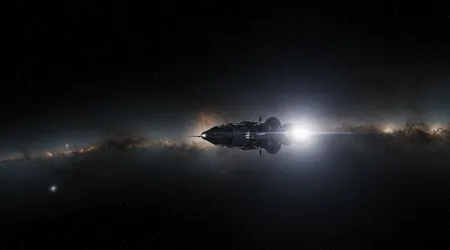The Fermi Paradox: Where Are All the Aliens?

Fermi Paradox looms large in cosmic discussions, questioning why, in a universe teeming with stars, we’ve found no trace of extraterrestrial intelligence.
Anúncios
Picture this: a 13.8-billion-year-old universe, brimming with billions of galaxies, each hosting billions of stars and potentially habitable planets. Yet, silence.
Enrico Fermi, during a 1950 lunch at Los Alamos, famously asked, “Where is everybody?” His query birthed a puzzle that challenges our assumptions about life, technology, and existence itself.
This article dives into the Fermi Paradox, exploring its implications, proposed solutions, and why it captivates scientists and philosophers in 2025.
From the Drake Equation to the Dark Forest Hypothesis, we’ll unravel why the cosmos remains eerily quiet. Is humanity alone, or are we missing something profound?
Join me as we navigate this intellectual odyssey, blending science, philosophy, and a touch of cosmic wonder.
The Cosmic Silence: Understanding the Fermi Paradox
Enrico Fermi’s casual question sparked a profound mystery. The Fermi Paradox highlights the contradiction between expected alien civilizations and their absence.
With 100–400 billion stars in the Milky Way, many hosting planets, life should thrive. Yet, SETI’s decades-long search yields nothing. Why? The paradox forces us to question life’s rarity or detectability.
Consider the Drake Equation, formulated by Frank Drake in 1961. It estimates communicative civilizations in our galaxy, factoring in star formation, habitable planets, and civilization longevity.
++ Can We Ever Know the Truth About the Universe?
Recent data, like NASA’s 2024 exoplanet surveys, suggest 60 billion habitable-zone planets exist in the Milky Way. Still, no signals. Are we looking wrong?
The paradox isn’t just scientific it’s philosophical. If life is common, why no contact? Are civilizations self-destructing, hiding, or transcending?
Each possibility reshapes our view of humanity’s place. The Fermi Paradox demands we confront uncomfortable truths about existence.
Analogies help. Imagine a cosmic party where Earth arrives early, but no one’s there. Are we the first, or did everyone leave? This tension drives exploration. The paradox isn’t a dead end; it’s a catalyst for curiosity.

Possible Solutions: Why the Silence?
The Great Filter Hypothesis
One chilling explanation for the Fermi Paradox is the Great Filter. Proposed by Robin Hanson, it suggests a barrier prevents civilizations from advancing. Is it abiogenesis, intelligence, or technology? If the filter lies ahead, humanity faces existential risks.
Data supports this. A 2023 Oxford study estimates a 50% chance we’re alone in the observable universe, citing low probabilities for intelligent life. Nuclear war, AI, or climate collapse could be filters. Our survival hinges on navigating these traps.
What if the filter is behind us? Earth’s 4.5-billion-year history suggests life’s emergence is rare. Complex life took billions of years. This rarity could explain the silence, making Earth a cosmic anomaly.
The Great Filter isn’t fatalistic. It’s a warning. By studying risks, we might bypass future filters. Are we ready to heed this cosmic caution?
Also read: Is Reality Subjective? Quantum Physics and Perception
The Dark Forest Hypothesis
Liu Cixin’s Dark Forest Hypothesis offers a grim perspective. Civilizations stay silent, fearing hostile others. Like hunters in a dark forest, they avoid detection. This resolves the Fermi Paradox by suggesting aliens exist but hide.
Interstellar distances fuel suspicion. Light-speed limits mean signals take years to cross stars. A civilization broadcasting risks annihilation by a malevolent rival. Silence becomes survival. Earth’s radio signals may endanger us.
Contrast this with optimism. Could benevolent civilizations form galactic alliances? The Dark Forest assumes universal paranoia, but cooperation might prevail. Still, caution explains why SETI hears nothing in 2025.
Read more: What If the Universe Is Conscious?
Imagine a galactic game of hide-and-seek. Earth, naively shouting, might attract predators. Should we stay quiet or keep calling? This hypothesis challenges our outreach strategy.
The Transcension Hypothesis
John Smart’s Transcension Hypothesis posits advanced civilizations leave physical reality. They create compact, virtual worlds, abandoning interstellar expansion. This explains the Fermi Paradox aliens aren’t here because they’re elsewhere.
Technology trends support this. Humanity’s shift to digital realms VR, AI hints at inward focus. Advanced beings might upload consciousness, ignoring outer space. Dyson Spheres or megastructures become unnecessary.
Philosophically, this reshapes purpose. If civilizations prioritize inner exploration, our expansionist dreams may be outdated. Are we chasing a cosmic dead end? The silence could reflect transcendence.
Picture a civilization as a hermit, retreating to a digital cave. They’re not gone just invisible. This hypothesis invites us to rethink intelligence’s trajectory.
The Role of Technology in the Fermi Paradox
Technology shapes the Fermi Paradox. Radio signals, once SETI’s focus, may be outdated. Advanced civilizations might use neutrinos or quantum communication, undetectable by us. Our tools limit our search.
In 2025, SETI evolves. AI-driven telescopes scan for technosignatures megastructures, waste heat, or atmospheric pollutants. A 2024 study in Nature found no Dyson Spheres in 5 million stars, narrowing possibilities. Are we looking for the wrong signs?
Interstellar travel’s feasibility matters. Even at 10% light speed, colonizing the galaxy takes millions of years. If travel is impractical, civilizations stay local, explaining the silence. Physics constrains ambition.
Conversely, self-replicating probes could swarm galaxies. Frank Tipler’s 1980 argument suggests their absence proves no aliens exist. Yet, probes might avoid Earth, cloaked or dormant. The paradox persists.
Technology’s double edge cuts deep. It enables contact but risks self-destruction. AI, unchecked, could outpace wisdom, as Michael Garrett’s 2023 paper warns. Are we broadcasting our doom?
| Solution | Explanation | Implication |
|---|---|---|
| Great Filter | Barrier halts civilizations | Humanity faces risks |
| Dark Forest | Aliens hide, fearing attack | Silence is survival |
| Transcension | Civilizations go virtual | Inward focus, not expansion |
Philosophical Implications: Are We Alone?
The Fermi Paradox isn’t just about aliens it’s about us. If we’re alone, humanity bears unique responsibility. A silent universe elevates our duty to preserve life. Is solitude a gift or curse?
Statistically, rarity is plausible. Oxford’s 2023 paper gives a 50% chance of cosmic solitude. This humbles us. Earth’s biosphere, vibrant yet fragile, becomes infinitely precious. We must protect it.
Alternatively, if aliens exist but remain silent, we’re part of a larger tapestry. Contact could redefine culture, science, religion. Imagine decoding an alien signal would it unite or divide us?
Philosophically, the paradox probes meaning. Do we create purpose in isolation or seek it through connection? The silence challenges our anthropocentric view, urging humility.
Consider a lighthouse keeper, alone on a cosmic shore. Are we signaling for ships that never come? The Fermi Paradox invites introspection, pushing us to define our legacy.
The Future of the Search: What’s Next?

In 2025, the quest to resolve the Fermi Paradox accelerates. New telescopes, like the SKA Observatory, scan deeper. AI sifts data, hunting anomalies. Will we find technosignatures soon?
Public interest grows. X posts reflect curiosity @MihneaDeVries (2025) muses tech outpaces wisdom, risking self-destruction. Crowdsourced science, like SETI@home, thrives. Humanity’s united in wonder.
Breakthrough Listen, funded by Yuri Milner, scans 1 million stars by 2027. If nothing’s found, the paradox deepens. Are we early, alone, or misdirected? Patience is key.
Future missions target biosignatures. JWST’s 2024 exoplanet atmosphere studies hint at life’s markers. If microbes exist elsewhere, the paradox shifts intelligence, not life, is rare.
What’s our role? Broadcasting messages, like Breakthrough Message, risks exposure. Should we listen passively or shout louder? The Fermi Paradox demands strategic choices.
Conclusion: Embracing the Cosmic Mystery
The Fermi Paradox endures as a beacon of curiosity in 2025. It challenges our science, philosophy, and imagination, urging us to explore the unknown.
Whether we’re alone, early, or overlooked, the silence speaks volumes. It warns of risks, hints at transcendence, and humbles our ambitions.
As we scan the stars with AI, telescopes, and hope, the paradox isn’t a problem it’s an invitation.
Let’s keep asking Fermi’s question, not for answers, but for the journey it inspires. Are we ready to meet the cosmos, or ourselves, in the quiet? The universe waits.
Frequently Asked Questions
1. What is the Fermi Paradox?
It’s the contradiction between the expected abundance of alien civilizations and the lack of evidence for them, first posed by Enrico Fermi.
2. Why haven’t we found aliens yet?
Possible reasons include life’s rarity (Great Filter), civilizations hiding (Dark Forest), or transcendence into virtual realms (Transcension Hypothesis).
3. Is the Great Filter real?
It’s a hypothesis, not proven. Oxford’s 2023 study suggests a 50% chance we’re alone, supporting the idea of a barrier.
4. Should we keep searching for aliens?
Yes. Projects like Breakthrough Listen and SKA Observatory expand our knowledge, even if we find nothing, refining our cosmic perspective.
5. Could aliens be dangerous?
The Dark Forest Hypothesis suggests hostile civilizations might attack if detected. Caution in broadcasting is debated among scientists.
